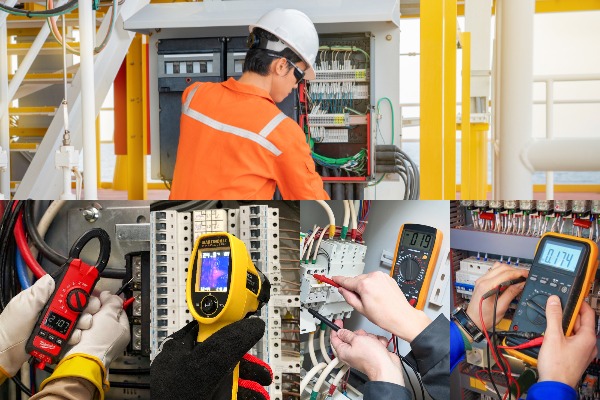Electrical fires are a common and dangerous consequence of improper electrical work. Homeowners should understand the most common electrical mistakes and how to avoid them. They should also have a reliable electrician who can safely and correctly diagnose, repair, and install electrical components. Find someone who can also handle emergencies, such as a power outage or an electrical fire. Here are the most common electrical mistakes to avoid.

Not Conducting Regular Inspections
Regular inspections and maintenance are crucial even when you’re confident the system is safe. Over time the wiring may come loose, connections degrade, or rodents chew through the wire. Seek electrical repair in Red Deer, Alberta, Canada experts with the experience and equipment to inspect your system correctly. They will check the panel, breaker box, wiring, outlets, and switches for any issues. This exercise is more important if you live in an older home or your usage has increased recently.
Using Too Many Extension Cords
Extension cords are convenient solutions, but they should be used only for temporary setups. They can quickly overheat and cause a house fire if overloaded. Use outlets and power strips designed to handle the load of multiple electronics instead of relying on extension cords.
When you have to use them, check if they have the correct wattage and amperage rating, don’t place them under furniture or rugs, and avoid using damaged cords. For the yard, use extension cords rated for outdoor applications.
Improperly Installed Wiring
Have secure connections and wiring that follow the manufacturer’s instructions. Properly ground the wiring, preventing fires. If unsure of what you’re doing, contact a professional electrician to make any additions or changes. Common wiring mistakes are using the incorrect size of wire, improper splicing and connections, or not correctly installing a circuit breaker. Also, ensure all connections are tight and secure.
Over time the wiring will come loose, connections degrade, or pests chew through the wire. A professional electrician can inspect your system but be on the lookout for any signs of poor electrical work, such as burnt wires, improper wiring, overloaded circuits, and flickering lights.
Also Read: 22 Unique Electrical Panel Cover Ideas + DIY Videos
Using the Wrong Fuses
For safety purposes, manufacturers recommend fuse sizes for specific circuits and appliances. Using the wrong fuses leads to overheating and, in some cases, electrical fires. Check the owner’s manual for the correct fuse size before replacing them. If you’re unsure, contact an electrician.
Overloading Outlets and Circuits
Outlets handle a certain number of appliances at once. Overloading outlets or circuits leads to overheating and causes an electrical fire. Install additional outlets or switch to power strips with overload protection if you have many appliances. Also, never use a power strip to plug in another one.
Outlets develop problems over time. Look for spark marks around the outlets, excess heat, or discoloration. Also, when the outlet is in use, feel the faceplate around it. If it’s warm to the touch or buzzes, it’s time for an electrician to check.
Also Read: Electrical Safety for Small Homes: 10 Things You Must Do
Not Using Ground Fault Circuit Interrupters (GFCI)
Ground fault circuit interrupters protect people from electrical shock. Install GFCIs around wet areas, such as under the sink or near a pool. The National Electric Code recommends GFCIs for all 15-amp and 20-amp receptacles. If you don’t have GFCIs, contact a professional electrician to install them. If you already have them check whether they operate properly.
Performing DIY Wiring and Repairs
Electrical projects require skilled professionals with specific training and safety knowledge. Doing the work yourself could lead to electrical shock and other disasters. You don’t want to take chances with your home’s wiring — an electrician will know the proper technique and use the right materials to avoid any problems.
Not letting a licensed electrician handle the work could also void the warranty on your home or appliances. Check with a professional if unsure, and always follow safety instructions when working around electricity. In case of a mistake or issue arising when carrying out DIY electrical repairs, don’t cover up. Explain to a professional electrician, enabling quicker diagnosis and repair.
Not Upgrading the Service Panel
The service panel is the central hub of your home’s electrical system; it should be up to code and in good condition. Over time, the panel becomes overloaded with additional wiring or appliances, resulting in damage and safety hazards. If unsure, contact an electrician. They will inspect the panel and replace it if needed. Also, consider upgrading to a more advanced service panel with safety features like surge protection.
Improper Lighting Installation
Light fixtures are often overlooked in electrical safety but cause electrical fires if not correctly installed. Check whether the wiring is secure and the connections are tight. When installing a new light, find if the wattage is within the power available. Because outdoor lights are exposed to the elements, they should be wired to a special weather-proof outlet.
Your Home Will Be Safe
Keeping your home safe and running smoothly requires regular maintenance and inspection. Never assume that something is safe; instead, stay on top of potential electrical hazards and get help from a professional electrician when needed. Doing so will prevent costly repairs and protect your family from electrical shock. Not forgetting, you’ll prolong the life of your appliances and save money on energy bills.